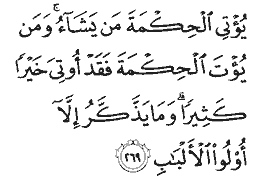Overflowing Benefit, Practical Evidence, Pragmatism
Issue 706 » October 5, 2012 - Dhul-Qida 19, 1433
Living The Quran
Overflowing Benefit
Al Baqara (The Cow) Chapter 2: Verse 269
 "He grants wisdom to whomever He wants, and whoever receives wisdom gains great benefits thereby; yet, only the insightful ever realize this."
"He grants wisdom to whomever He wants, and whoever receives wisdom gains great benefits thereby; yet, only the insightful ever realize this."
Although the term has a broad range of meanings, "the wisdom" basically signifies insight, discernment, and knowledge of creation, life, right and wrong, and of the Divine system prevailing in the universe, so as to enable persuasive, convincing answers for such questions as "Who am I? What is the purpose for my existence in this world? Who has sent me to this world and why? Where did I come from and where am I heading? What does death ask of me?" It may be regarded, from one perspective, as harmony with Divine Destiny or knowledge of it. Wisdom is a name that signifies the accuracy of putting something in its right place.
It is of three levels:
1. The first level consists in giving each thing its due, not exceeding its limit and not rushing its time.
2. The second level consists in attesting to God's view in his threat, knowing His justice in His Judgment (Ruling) and observing His beneficence in His prohibition.
3. The third level consists in attaining divine guidance in one's search, the truth in one's guidance and the goal in one's counsel.
Compiled From:
"The Holy Quran: Guidance for Life" - Yahiya Emerick, pp. 40-41
"Stations of the Wayfarers" - Abdullah Al-Ansari, p. 146
"The Quran: Annotated Interpretation in Modern English" - Ali Unal, pp. 114, 115
Understanding The Prophet's Life
Practical Evidence
It is preferable to use the lucid, yet simply-worded blessings for the Prophet which have been passed down to us by the first generations of Muslims, rather than the affected, difficult formulas for which missals have been written, group recitations convened, and names for the Prophet invented - names for which Allah has revealed no legitimation. Surely it is not the mere repetition of eloquent phrases that is important. What matters is one's acknowledgement of the favour done by the Prophet, upon him be peace, for the betterment of the believers, one's appreciation of the jihad he waged against the forces of ignorance, and one's allegiance to the nation which he founded in the name of ultimate truth.
This is the real meaning of seeking blessings for the Prophet of Allah, upon him be peace. And only those who give practical evidence of their appreciation of this meaning will receive the rewards promised to those who seek blessings for the Prophet, upon him be peace. Certainly those self-acclaimed 'lovers of the Prophet' who hollowly echo set phrases, yet who are unable to stand in defence of the Sunnah, cannot ever be eligible for such rewards. It is with regard to the defenders of the faith, those who truly appreciate the Prophet, upon him be peace, that this hadith is related:
Whosoever seeks blessings for me will be blessed ten times over by the Almighty.
Abdullah ibn Masud related that the Prophet, upon him be peace, said:
On the Day of Judgement, the people most deserving of (a relationship with) me will be those who have most often sought blessings for me.
Compiled From:
"Remembrance And Prayer" - Muhammad Al-Ghazali, pp. 104-105
Blindspot!
Pragmatism
Pragmatism, adaptability and flexibility arise out of broad experience, balanced knowledge and thinking. The Prophet Muhammad and his faithful Companions constantly remained open-minded, outward looking and alert. They were flexible in their approach and had no hesitation to learn and relearn, and adapt to the changes occurring in the external social environment, whilst holding fast to their faith and principles. They prepared themselves for any threats, made use of opportunities and kept themselves fully informed of the developing situation in their society. They did not create mind-guards or become inward looking.
Enslavement to structures, bureaucratic procedures, language and ways of working was not part of their style or attitude. In fact, such attitudes and rigidity stifles creativity and innovation, and can lead towards stagnation. and even to decay. This is why Muslims are enjoined not to be rigid or follow anyone blindly. They must only abide by, and work within the framework of the beliefs and principles encoded in the sources of Islam, i.e. the Quran and Sunna. Principles of Islamic jurisprudence highlight that anything outside the basic sources of Islamic guidance, including the opinions of scholars, is not sacred and subject to change, improvement or modification.
Compiled From:
"Building A New Society" - Zahid Parvez, pp. 201, 202